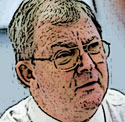 Australian scientists have begun a push back against climate denial. Over at the excellent The Conversation site (a hugely interesting experiment in bringing academic expertise to the news cycle), Stephan Lewandowsky and a long list of prominent Australian academics have kicked off a series of articles “from the nation’s top minds on the science behind climate change and the efforts of “sceptics” to cloud the debate” titled Clearing up the Climate Debate.
Australian scientists have begun a push back against climate denial. Over at the excellent The Conversation site (a hugely interesting experiment in bringing academic expertise to the news cycle), Stephan Lewandowsky and a long list of prominent Australian academics have kicked off a series of articles “from the nation’s top minds on the science behind climate change and the efforts of “sceptics” to cloud the debate” titled Clearing up the Climate Debate.
Beginning today, The Conversation will bring much-needed and long-overdue accountability to the climate “sceptics.”
For the next two weeks, our series of daily analyses will show how they can side-step the scientific literature and how they subvert normal peer review. They invariably ignore clear refutations of their arguments and continue to promote demonstrably false critiques.
We will show that “sceptics” often show little regard for truth and the critical procedures of the ethical conduct of science on which real skepticism is based.
The individuals who deny the balance of scientific evidence on climate change will impose a heavy future burden on Australians if their unsupported opinions are given undue credence.
Not to mention imposing a heavy future burden on everyone else on the planet…
Lewandowsky’s introduction was followed in short order by The greenhouse effect is real: here’s why, by Karl Braganza of the Bureau of Meteorology — an admirably succinct statement of the facts of the matter.
The climate of Earth is now a closely monitored thing; from instruments in space, in the deep ocean, in the atmosphere and across the surface of both land and sea.
It’s now practically certain that increasing greenhouse gases have already warmed the climate system.
That continued rapid increases in greenhouse gases will cause rapid future warming is irrefutable.
This is an important series of articles: one worth following in detail. Congrats to Steve and everyone involved.

 Over at Treadgold’s emporium, the owner is mining a rich vein of nonsense: he’s posting the letters to the editor the newspapers won’t print. One that
Over at Treadgold’s emporium, the owner is mining a rich vein of nonsense: he’s posting the letters to the editor the newspapers won’t print. One that  Australian climate scientists have been receiving abusive emails — even death threats — from people who mistake violence for political expression. Graham Readfearn provides
Australian climate scientists have been receiving abusive emails — even death threats — from people who mistake violence for political expression. Graham Readfearn provides  A couple of days ago one of the leading figures in the New Zealand climate crank pantheon, the Climate “Science” Coalition’s very own
A couple of days ago one of the leading figures in the New Zealand climate crank pantheon, the Climate “Science” Coalition’s very own